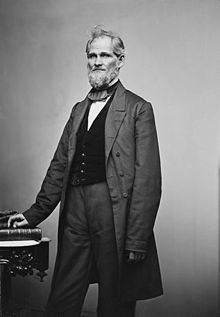
Back هنري سميث لين Arabic هنرى سميث لين ARZ هنری اسمیت لین AZB Henry Smith Lane German هنری اسمیت لین Persian הנרי סמית' ליין HE Henry Smith Lane Hungarian Henry Smith Lane Swedish
Henry S. Lane | |
|---|---|
 | |
| United States Senator from Indiana | |
| In office March 4, 1861 – March 3, 1867 | |
| Preceded by | Graham N. Fitch |
| Succeeded by | Oliver P. Morton |
| 13th Governor of Indiana | |
| In office January 14, 1861 – January 16, 1861 | |
| Lieutenant | Oliver P. Morton |
| Preceded by | Abram A. Hammond |
| Succeeded by | Oliver P. Morton |
| Member of the U. S. House of Representatives from Indiana's 7th district | |
| In office August 3, 1840 – March 3, 1843 | |
| Preceded by | Tilghman A. Howard |
| Succeeded by | Joseph A. Wright |
| Member of the Indiana House of Representatives | |
| In office 1838–1839 | |
| Member of the Indiana Senate | |
| In office 1837 | |
| Personal details | |
| Born | February 24, 1811 Sharpsburg, Kentucky, US |
| Died | June 19, 1881 (aged 70) Crawfordsville, Indiana, US |
| Political party | Whig Know-Nothing Party Republican |
| Spouse(s) | Pamela Bledsoe Joanna Maria Elston |
| Military service | |
| Allegiance | United States of America Union |
| Branch/service | United States Army |
| Years of service | 1846–1847 |
| Rank | Lieutenant Colonel |
| Commands | First Indiana Regiment Infantry |
| Battles/wars | Mexican–American War |
Henry Smith Lane (February 24, 1811 – June 19, 1881) was a United States representative, Senator, and the 13th Governor of Indiana; he was by design the shortest-serving governor of Indiana, having made plans to resign the office should his party take control of the Indiana General Assembly and elect him to the United States Senate. He held that office for only two days, and was known for his opposition to slavery. A Whig until the party collapsed, he supported compromise with the South. He became an early leader in the Republican Party starting in 1856 serving as the president of the first party convention, delivering its keynote address, and was influential in the nomination of Abraham Lincoln. With the repeal of the Missouri Compromise, he became a full-fledged abolitionist, and in the Senate he was a pro-Union advocate and a strong supporter of the war effort to defeat the Southern Confederacy.[1]
- ^ Sharp, Walter Rice (1920). "Henry S. Lane and the Formation of the Republican Party in Indiana". The Mississippi Valley Historical Review. 7 (2): 93–112. doi:10.2307/1902652. ISSN 0161-391X.
© MMXXIII Rich X Search. We shall prevail. All rights reserved. Rich X Search